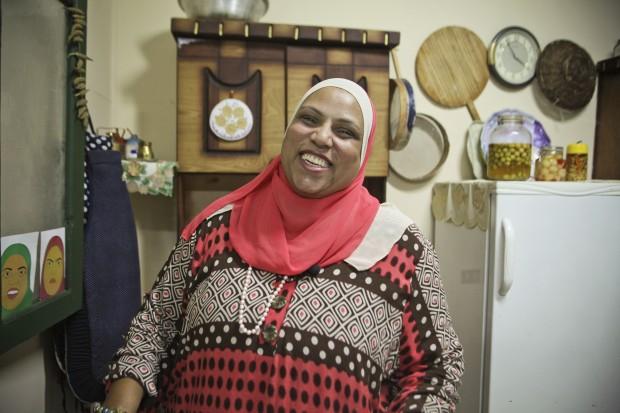El Set Ghalia: The Egyptian Oprah
Ghalia Mahmoud (Photo: Tara Todras-Whitehill)
In a country where a large part of the population struggles to make ends meet, a working class woman has skyrocketed to fame in post-revolutionary Egypt with a new kind of cooking show. It’s for people without much money and it’s a breath of fresh air for lower class Egyptians who are used to being sidelined and ignored.
While the onions and garlic start to cook in the oil, Ghalia Mahmoud buzzes around the set of her cooking show, called ‘El Set Ghalia’ or — ‘Mrs. Ghalia.’ She wears a bright pink hijab and a string of fake pearls, which highlight her round smiling face.
She’s been called ‘The Oprah of Egypt’, and like Oprah Winfrey, Ghalia rose to fame from poverty. She’s from one of the poorest suburbs in Cairo, and used to work long hours as a maid. One day a relative of her wealthy employer tasted her food and decided to make her the star of his newest TV program — a cooking show for the masses — something that had never been tried before in Egypt.
“Some people criticized us when we began because they weren’t used to seeing people like us on TV,” Ghalia says. “They are used to seeing big chefs and celebrities cooking meat and turkey and the fancy food but they weren’t used to seeing people cook simple food that Egyptians usually eat, like we do.”
The idea of the program is simple — good cheap dishes, using ingredients Egyptians actually use. The set is made to look like her kitchen — cramped, strewn with homey knick-knacks and practical, inexpensive cookware. She cooks on small stove top.
Each show is taped live, and Ghalia makes four-five meals. Each dish is meant to serve at least eight people, for less than 30 cents per portion. This is crucial in a country where over 15 million people live on less than a dollar a day, and food prices are continuing to rise.
With her bubbly energy and contagious smile Ghalia isn’t just a chef, she’s a counselor too. Viewers phone in and Ghalia chats with them about the problems they are facing in their own lives. She says this is especially important for poor women, who might feel like they otherwise wouldn’t have a voice.
Shows can be found on YouTube, and on one episode, Ghalia cooks pasta while talking with a viewer, Umm Ahmed. Umm Ahmed tells Ghalia how much the show means to her and says she feels Ghalia is like a sister.
Amira Fouzy, Ghalia’s producer, explains that the show fills a vital role in post revolutionary Egypt. It started as a cooking show for the poor, but has also evolved into a program where everyone has a voice, no matter what their economic status.
She says Ghalia “also addresses human rights — social issues, marital issues and women’s rights. She expresses it in a simple way. She solves problems on air and gives popular sayings that would make people understand her better. We are trying to reach this audience in a simple straightforward way.”
The Facebook page for ‘El Set Ghalia’ has swelled to over 100,000 followers and keeps on growing.
Ghalia says none of this would have been possible without the Egyptian revolution. “Of course everything has changed after the revolution. Before the revolution the media used to attack poor, simple people on TV. They didn’t want us on.”
But now she believes people like her and her children will have more opportunities — the Egyptian people brought down the old regime, and there is a sense that anything is possible, especially if everyone pitches in.
“I am hoping that they will grow up and have a chance to work and benefit their country as well. That’s the main thing — it’s their responsibility to help their country, because if they make their country better they make themselves better,” Ghalia says.
But despite her success the ‘Oprah of Egypt’ still has a long way to go before she surpasses the real thing.
Ghalia can’t give away cars yet, but she’s giving away something just as valuable right now — a message of hope served up one meal at a time.
The story you just read is available to read for free because thousands of listeners and readers like you generously support our nonprofit newsroom. Every day, the reporters and producers at The World are hard at work bringing you human-centered news from across the globe. But we can’t do it without you: We need your support to ensure we can continue this work for another year.
When you make a gift of $10 or more a month, we’ll invite you to a virtual behind-the-scenes tour of our newsroom to thank you for being with The World.
